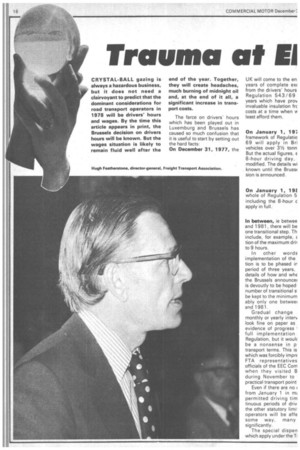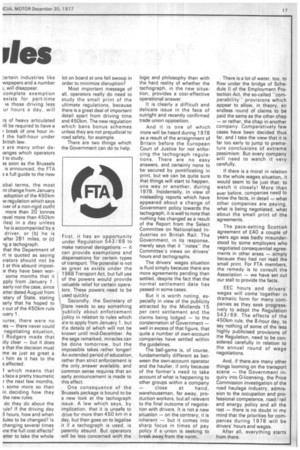Trauma at El des
Page 18

Page 19

If you've noticed an error in this article please click here to report it so we can fix it.
CRYSTAL-BALL gazing is always a hazardous business, but it does not need a clairvoyant to predict that the dominant considerations for road transport operators in 1978 will be drivers' hours and wages. By the time this article appears in print, the Brussels decision on drivers hours will be known. But the wages situation is likely to remain fluid well after the end of the year. Together, they will create headaches, much burning of midnight oil and, at the end of it all, a significant increase in transport costs.
The farce on drivers hours which has been played out in Luxemburg and Brussels has caused so much confusion that it is useful to start by setting out the hard facts: On December 31, 1977, the UK will come to the en. years of complete ex( from the drivers' hours Regulation 543/69 years which have prov invaluable insulation frc costs at a time when vl least afford them.
On January 1, 191 framework of Regulatio 69 will apply in Bri vehicles over 31/2 tonn But the actual figures, E 8-hour driving day, modified. The details wi known until the Brussi sion is announced.
On January 1, 191 whole of Regulation 5 including the 8-hour c apply in full.
in between, ie betwee and 1981, there will be one transitional step. Th include, for example, C tion of the maximum dri+ to 9 hours.
In other words implementation of the tion is to be phased ir period of three years, details of how and whE the Brussels announcei is devoutly to be hoped number of transitional s. be kept to the minimum ably only one betweei and 1981.
Gradual change monthly or yearly intend look fine on paper as evidence of progress full implementation Regulation, but it wouk be a nonsense in p transport terms. This is which was forcibly impr( ETA representatives officials of the EEC Corn when they visited B during November to practical transport point
Even if there are no from January 1 in M4 permitted driving tim tinuous periods of driv the other statutory limi. operators will be affe some way, many significantly.
The special dispen which apply under the Ti certain industries like wspapers and a number ;, will disappear. complete exemption exists for part-time ie those driving less ur hours a day, will is of heavy articulated till be required to have a
break of one hour inf the half-hour under 36-fish law.
a are many other deianges which operators to study.
3s soon as the Brussels is announced, the ETA 3 a full guide to the new
obal terms, the most nt change from January adoption of the 450km ie regulation which says iver of a non-rigid outfit more than 20 tonnes ravel more than 450km iles) in a day unless he is accompanied by a driver, or (b) he is after 281 miles, or (c) a tachograph.
that the Department of it is quoted as saying arators should not be I at this absurd imposi:e they have been war. some months that it pply from January 1. early not the case, since etter dated August from -etary of State, stating :arly that he hoped to 3 out of the 450km rule wary 1.
)urse, there were no ies — there never could negotiating situation, I Rodgers made that itly clear — but it does e that the decision must me as just as great a him as it has to the s affected.
f which means that face a pretty traumatic r the next few months, ) some more so than in deciding how they the new rules.
do they do about the -ule? If the driving day 3 hours, how and when Jules to be changed? Is changing several times me the full cost effects? etter to take the whole
lot on board at one fell swoop in order to minimize disruption?
Most important message of all, operators really do need to study the small print of the ultimate regulations, because there is a great deal of important detail apart from driving time and 450km. The new regulation which bans bonus schemes unless they are not prejudicial to road safety, for example.
There are two things which the Government can do to help.
First, it has an opportunity under Regulation 543/69 to make national derogations — it can provide exemptions and dispensations for certain types of transport. The potential is not as great as exists under the 1968 Transport Act, but full use of the powers would provide valuable relief for certain operators. These powers need to be used quickly.
Secondly, the Secretary of State needs to say something dublicly about enforcement i.olicy in relation to rules which a-e to apply from January 1, but th.e details of which will not be known until mid-December. As the sage remarked, miracles can be done tomorrow, but the impossible takes rather longer! An extended period of education, rather than strict enforcement is the only. answer available, and common sense requires that an early announcement is made to this effect.
One consequence of the Brussels package is bound to be a new look at the tachograph issue. A law which says, by implication, that it is unsafe to drive for more than 450 km in a day, but then goes on to legalise it if a tachograph is used, is patently absurd. But operators will be less concerned with the logic and philosophy than with the hard reality of whether the tachograph, in the new situation, provides a cost-effective operational answer.
It is clearly a difficult and delicate issue in the face of outright and recently confirmed trade union opposition.
And it is one of which more will be heard during 1 978 as a result of the arraignment of Britain before the European Court of Justice for not enforcing the tachograph regulations. There are no easy answers, and certainly none to be secured by pontificating in print, but we can be quite sure that things will start to happen, one way or another, during 1978. Incidentally, in view of misleading reports which have appeared about a change of Government policy towards the tachograph, it is well to note that nothing has changed as a result of the Report from the Select Committee on Nationalised Industries on British Rail. The Government, in its response, merely says that it "notes" the Committee's views on drivers' hours and tachographs.
The drivers' wages situation is fluid simply because there are more agreements pending than settled, despite the fact that the normal settlement date has passed in some cases.
But it is worth noting, especially in view of the publicity attracted by the Midlands 15 per cent settlement and the claims being lodged — to the consternation of Government — well in excess of that figure, that quite a number of own-account companies have settled within the guidelines.
The ball-game is, of course, fundamentally different as between the own-account operator and the haulier, if only because of the former's need to take account of what is happening to other groups within a company close at hand, warehouseman, far away, production workers, but all relevant to the final outcome of negotiation with drivers. It is not a new situation — on the contrary, it is inherent — but it comes into sharp focus in times of pay policy if a union is seeking to break away from the norm. There is a lot of water, too, to flow under the bridge of Schedule II of the Employment Protection Act, the so-called "comparability" provisions which appear to allow, in theory, an endless round of claims to be paid the same as the other chap — or rather, the chap in another company. Comparatively few cases have been decided thus far, and I take the view that it is far too early to jump to premature conclusions of extreme pessimism. But every company will need to watch it very carefully.
If there is a moral in relation to the whole wages situation, it would seem to be just that: to watch it closely! More than ever before, companies need to know the facts, in detail what other companies are paying, what is being negotiated, what about the small print of the agreements.
The pace-setting Scottish agreement of £40 a couple of years ago was badly misunderstood by some employers who negotiated consequential agreements in other areas — simply because they had not read the small print. For FTA members, the remedy is to consult the Association — we have set out our stall to provide the facts.
EEC hours and drivers' wages will come together in dramatic form for many companies as they seek progressively to adapt the Regulation 543/69. The effects of the 450km rule, the 8-hour day, to say nothing of some of the less highly publicised provisions of the Regulation, need to be considered carefully in relation to the annual round of wage negotiations.
And, if there.are many other things looming on the transport scene — the Government inquiry into 0-licensing, the Price Commission investigation of the road haulage industry, admission to the occupation and professional competence, road/rail and energy policy and all the rest — there is no doubt in my mind that the priorities for companies during 1978 will be drivers' hours and wages.
After all, everything starts from there.




























































